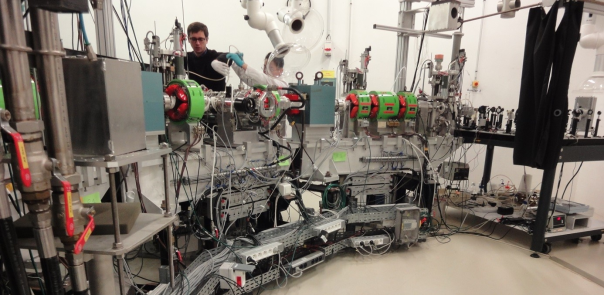
Unique linear picosecond electron accelerator in Europe devoted to pulse radiolysis
Who?
ELYSE is a platform born from the will of the physico-chemists of the CNRS and the University Paris 11 (nowadays University Paris-Saclay, Institute of Chemical Physics UMR8000 CNRS) by pooling skills, human resources and scientific equipment for the study of elementary chemical and biochemical reactions in ultra-short times.
As a tool for fundamental research, ELYSE offers high-performance equipment for the study of ultrafast chemical reactions.
Why?
The study of elementary chemical and biochemical acts by techniques in “ultra-short” times constitutes a part of science in full expansion: what chemist has not wished to see (or “film”) the detail of the movements of molecules at the moment when the transformation of matter takes place? This dream is a reality.
The vocation of ELYSE is to trigger in a short time the physical and/or chemical phenomena generated by the passage of a high-energy electron beam, or laser beams, and to observe them by detection methods resolved in time, often by UV-Vis spectroscopy.
What?
- The excited states in condensed phase
- The primary effects in radiolysis
- Radical chemistry on surfaces
- Bio-relavent radical chemistry: DNA damage, etc.
How?
The platform consists of several independant experimental setups for conducting radiolysis experiments:
- pulse-probe spectroscopy with stroboscopic detection 10ps-11.5ns broad-range 350-1450nm
- pulse-probe spectroscopy with streak-camera detection 1ns-1ms
- pulse-pump-probe spectroscopy with 100fs resolution and waiting time 0-6ns
- pulse electrochemistry
- radiolysis of solutions under gas pressure (150 atm)